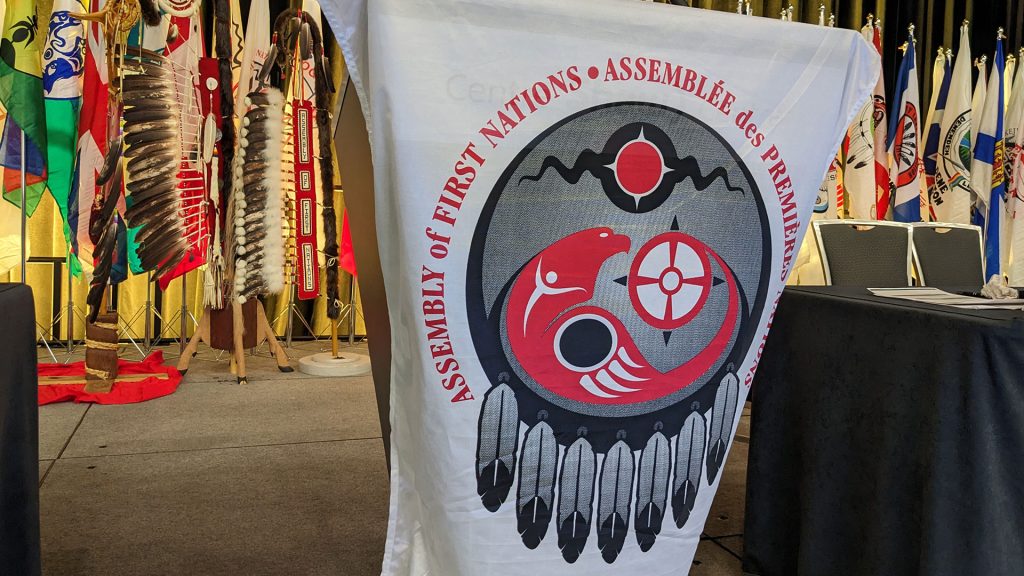
The AFN recently elected a new national chief in Ottawa but will it make a difference to the organization? Photo: APTN.
A long time ago, like 20 plus years or so, critics called the Assembly of First Nations, or AFN, too compliant and too willing to collaborate with federal First Nation policies, out of touch with First Nation territories, not listening to or caring what First Nation peoples were telling it.
Things only seemed to get worse.
Even then, stories emerged from insiders who worked at AFN on developing First Nations-led initiatives or were tasked by the AFN executive to respond to federal ones. These researchers would do the regional consultations, meet with people and organizations, collect their feedback and recommendations, and produce DRAFT documents that they sent up the chain to the national chief’s office.
They said this is where they hit brick walls.
The national chief was surrounded by a ring of advisors that included DIA [Department of Indian Affairs], today’s ISC [Indigenous Services Canada] officials on loan. There was also the executive council (regional chiefs) as well. The advisors and executive council would read the DRAFT, nit-pick whether it was Aboriginal “peoples” with an “S” and send the document back downstairs with comments such as: “DIA won’t like this.” Or instructions such as,“DIA says change it to…” There might be “an or else” implied.
Even then, complaints of this type of interference weren’t new. Insiders said it became standard operating procedure. The cozy connections between DIA and AFN at the executive level were off-book, informal, and mostly unrecorded but went on with AFN acting, so I was told, “like an extension of the minister’s office.”
I observed similar relationships between a couple of national Indigenous organizations that I worked at during, thankfully, a short past life. Usually, money — funding — was the incentive for the organization or prestige for the heads of these organizations to get chummy with whatever department they happened to be working with, such as Health or Indigenous Affairs.
It didn’t seem to matter to the national offices what their members or folks back home wanted, needed or expected. One must always “look at the big picture” to borrow a Hollywood cliché. The greater good was too often what the federal government department wanted and it had the funding clout to make it so.
I don’t expect this to change much with the latest winner of “musical chairs” at the AFN. Russell Diabo has a bead on federal influence deciding who would become the next national chief — and he’s mostly right. It does seem like the AFN understands which candidate the feds like better each time. Lessons learned, I guess.
I noticed a few things from the speeches, and platforms (if you can call them that) of the various candidates for national chief:
1) No one’s talking about renewing the forensic audit approved by past assemblies;
2) No one’s talking about the schism between “traditional governments, territorial sovereignty” and band councils surrendering those values across northern Ontario, British Columbia, Yukon, Labrador and Quebec;
3) No one’s talking about “municipalization” pushed by federal policy and legislation (maybe because they’re sick and tired of hearing Russell Diabo rattle on and on about it).
So what does the AFN stand for besides boring, empty, weak platitudes like “unity” and “gotta get along” with each other? How to divvy up settlement money from lawsuits or benefits packages from pipelines and mining? Surely, there are more fundamental issues to be concerned about.
Where are the debates on core values? What does the organization stand for or against? Where’s any line in the sand for First Nations on self-determination and jurisdiction? In other words—Where’s the “friggin’ beef?”
The AFN is proving itself a very capable and efficient partner in furthering federal policy objectives. Shouldn’t the chiefs at the AFN be asking themselves if their folks back home want the AFN to be that? Or something else?
The AFN seems to have become less an advocacy organization asserting the rights of First Nations people and instead choosing the path of least resistance as a collaborative organization and willing arm of the federal government.
Read more:
Attendees at special chiefs assembly in Ottawa warned they had better behave











